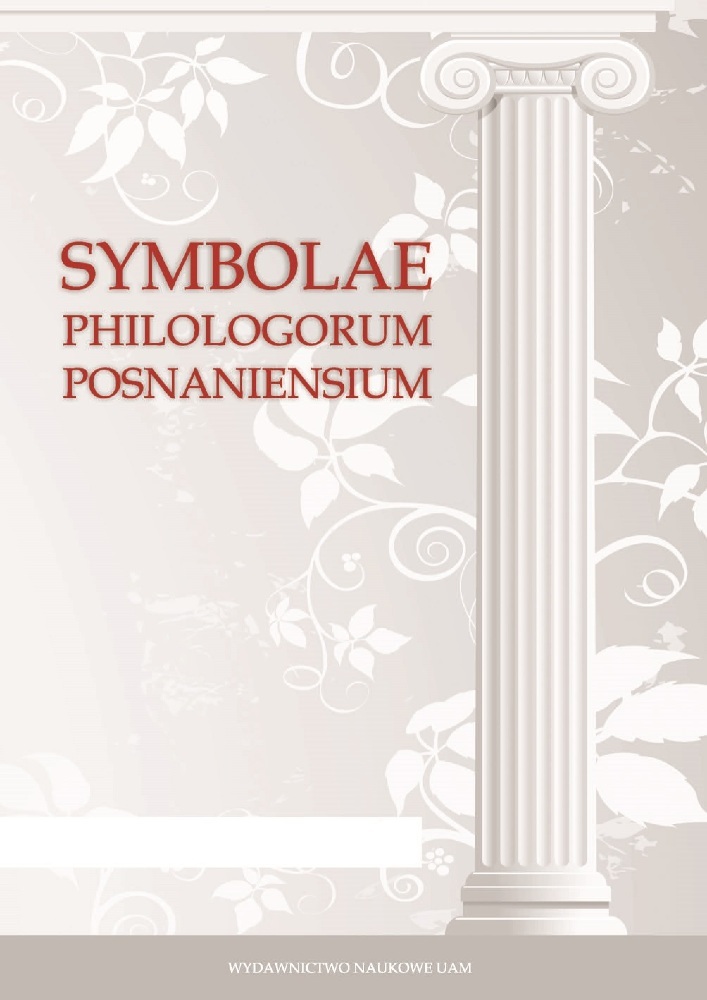Abstrakt
The image of the historical athlete who enters the ancient Greek stadium is a perfect medium for clarifying the conceptual philosopher’s liberation from material bonds and ascent to the higher causal order in Porphyry’s On the Abstinence from Eating Flesh. The image is emphasized when Porphyry prescribes the practice of vegetarianism and immaterial sacrifice for the conceptual philosopher’s preparation for the specific ‘contest’of freeing from material concerns such as food and sacrifice and eventual transformation in to the as the priest of the Highest God.
Bibliografia
Primary sources
Cicero. De Finibus. Ed. by H. Harris. 1931. Rackham.
Diogenes Laertius. Lives of Philosophers. Ed. by D. Hicks. 1947. London and New York.
Epictetus. Discourses. Tr. by G. Long. 1904. New York.
Marcus Aurelius. The Meditations of Marcus Aurelius. Tr. by G. Long. 1909–1914. New York.
Musonius Rufus, The Roman Socrates. Ed. by A. R. Bellinger. 1947. Yale.
Philostratus. Heroicus and Gymnasticus, Discourses 1 and 2. Ed. by J.P. Koenig and J. Rusten. 2014. Cambridge and London.
Plato. Complete Works. Ed. by J.M. Cooper. 1997. Cambridge.
Plotinus. Enneades. Ed. by P. Henry and H.R. Schwyzer. 1964–1982. Oxford.
Porphyry. On the Abstinence from Eating Flesh. Repr. by the Prometheus Trust. 2008.Westbury-Wiltshire.
Secondary sources
Bazell 1997: Bazell, D.M. 1997. “Strife among the Table-Fellows: Conflicting Attitudes of Early and Medieval Christians toward the Eating of Meat.” Journal of the American Academy of Religion 65: 73–99.
Beer 2010: Beer, M. 2010. Taste or Taboo: Dietary Choices in Antiquity. Blackawton: Prospect Books.
Bonfante 1989: Bonfante, L.1989. “Nudity as a Costume in Classical Art.” American Journal of Archeology 93: 543–570.
Brown 1971: Brown, P. 1971. “The Rise and Function of the Holy Man in Late Antiquity.” The Journal of Roman Studies 61: 80–101.
Christessen 2014: Christessen, P. 2014. “Sport and Democratization in Ancient Greece.” In A Companion to Sport and Spectacle in Greek and Roman Antiquity. Ed. by P. Christessen and D.G. Kyle, 211–235. Oxford: Blackwell.
Clark 2001: Clark, G. 2001. “Fattening the Soul: Christian Asceticism and Porphyry on Abstinence in Ascetic.” Gnostics, Liturgica, Orientalia, Studia Patristica 35: 41–51.
Clark 1999: Clark, G. 1999. “Translate in to Greek: Porphyry of Tyre on the New Barbarians.” In Constructing Identities in Late Antiquity. Ed. by R. Miles, 112–132. London and New York: Routledge.
Clark 2005: Clark, G. 2005. “The health of the spiritual athlete.” In Health in Antiquity. Ed. by H. King, 216–229. Routledge: London and New York.
DePalma 2001: DePalma, D. 2001. “Porphyry, Lactantius and Paths to God.” Studia Patristica 34: 521–528.
Dodds 1968: Dodds, E.R. 1968. Pagan and Christian in an Age of Anxiety. Cambridge: Cambridge University Press.
Dombrowski 1987: Dombrowski, D. 1987. “Asceticism as Athletic Training in Plotinus.” Aufstieg und Niedergang der römischen Welt 36: 701–712.
Eckhardt 2014: Eckhardt, B. 2014. “Bloodless Sacrifice: A Note on Greek Cultic Language in the Imperial Era.” Greek, Roman and Byzantine Studies 54: 255–273.
Ekroth 2008: Ekroth, G. 2008. “Burnt, Cooked or Raw? Divine and Human Culinary Desires at Greek Animal Sacrifice Transformations.” In Sacrificial Practices: From Antiquity to Modern Times. Ed. by E. Stavrianopoulou, A. Michaels, and C. Ambos, 87–112. Berlin: Lit Verlag.
Fergusson 1980: Fergusson, E. 1980. “Spiritual Sacrifice in Early Christianity and Its Environment.” In Aufstieg und Niedergang der römischen Welt. Ed. by H. Temporini and W. Haase, 1151–1189. Berlin: de Gruyter.
Figuera 1984: Figuera, T.J. 1984. “Mess Contributions and Subsistence at Sparta.” Transactions of the American Philological Association 114: 87–109.
Finn Op 2009: Finn Op, R. 2009. Asceticism in the Graeco-Roman World. Cambridge: Cambridge University Press.
Hadot 1985: Hadot, P. 1985. Philosophy as a Way of Life: Spiritual Exercises from Socrates to Foucault. Oxford: Blackwell.
Holladay 1977: Holladay, A.J. 1977. “Spartan Austerity.” The Classical Quarterly 27: 111–126.
Hynek 2015: Hynek, B. 2015. Philosophy and Dietetics in the Hippocratic On Regimen: A Delicate Balance. Leiden-Boston: Brill.
Jameson 1994: Jameson, M.H. 1994. “Theoxenia in Ancient Greek Cult Practice from the Epigraphical Evidence.” Swedish Institute at Athens ActaAth-8o 13: 35–57.
Johnson 2013: Johnson, A. P. 2013. Religion and Identity in Porphyry of Tyre: The Limits of Hellenism in Late Antiquity. Cambridge: Cambridge University Press.
Kearns 2001: Kearns, K. 2011. “Ὁ λιβανωτὸς εὐσεβές καὶ τὸ ̟ό̟ανον: The Rationale of Cakes and Bloodless Offerings in Greek Sacrifice.” Kernos Supplement 26: 89–103.
Krueger 1999: Krueger, D. 1999. “Hagiography as an Ascetic Practice in the Early Christian East.” The Journal of Religion 79: 216–232.
Marx-Wolf 2010: Marx-Wolf, H. 2010. “High Priests of the Highest God: Third-Century Platonists as Ritual Experts.” Journal of Early Christian Studies 18: 481–513.
Naiden 2013: Naiden, F. S. 2013. Smoke Signals for the Gods: Ancient Greek Sacrifice from the Archaic Through Roman Periods. Oxford: Oxford University Press.
Nilsson 1945: Nilsson, M. 1945. “Pagan divine service in late antiquity.” Harvard Theological Review 65: 63–69.
Pritchard 2013: Pritchard, D. 2013. Sport, Democracy and War in Classical Athens. Cambridge: Cambridge University Press.
Purcell 2003: Purcell, N. 2003. “The Way We Used to Eat: Diet, Community and History at Rome.” American Journal of Philology 124: 330–358.
Remijsen 2015: Remijsen, S. 2015. The End of Athletics in Late Antiquity. Greek Culture in the Roman World. Cambridge: Cambridge University Press.
Rivers 2003: Rives, J.B. 2003. “The Theology of Animal Sacrifice in the Ancient Greek World: Origins and Developments.” In Ancient Mediterranean Sacrifice. Ed. by J.V. Knust and Z. Varhelyi, 187–202. Oxford and New York: Oxford University Press.
Totelin 2009: Totelin, L. 2009. Hippocratic Recipes: Oral and Written Transmission of Pharmacological Knowledge in Fifth- and Fourth-Century Greece. Leiden: Brill.
Townsend 2003: Townsend, P. 2003. “Bonds of Flesh and Blood: Porphyry, Animal Sacrifice and Empire.” In Ancient Mediterranean Sacrifice. Ed. by J.V. Knust and Z. Varhelyi, 214–231. Oxford and New York: Oxford University Press.
Vaage 1992: Vaage, L.E. 1992. “Like Dogs Barking: Cynic Parresia and Shameless Asceticism.” Semeia 57: 25–39.
Zhmud 2012: Zhmud, L. 2012. Pythagoras and the Early Pythagoreans. Oxford: Oxford University Press.
Licencja
